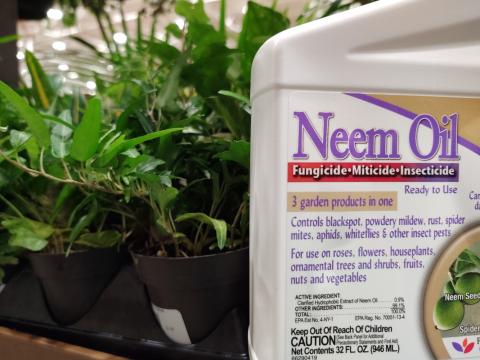What should neem be used for on plants?

Neem is a naturally occurring pesticide that comes from the seeds of the neem tree (Azadirachta indica). Neem trees are native to tropical forests in Burma, India and Sri Lanka. Within the tree’s native range, it has been used as a botanical insecticide for many hundreds of years. With growing interest in organic and less-toxic pesticide options, neem products have become very easy to find at most garden centers. It may be the first bottle many gardeners now reach for when they have a pest issue. Neem can be an important tool in an integrated pest management plan as long as you understand how it works and only apply products according to label instructions.
Neem products usually have one of two active ingredients. Azadirachtin is a substance derived from neem seed oil and is most responsible for killing and repelling insects. After the Azadirachtin is extracted from neem oil, the remaining material is called clarified hydrophobic neem oil. Azadiractin is only available in commercial products used to disrupt insect hormones that control growth and reproduction. Clarified hydrophobic neem oil is the active ingredient in ready-to-use neem oil sprays that can be picked up at a garden center.
Neem oil can be used for certain insect and fungal disease issues. It kills insects by suffocation, covering their bodies with oil that blocks their breathing openings. It is most effective against immature insects. Mature adult insects aren’t typically killed and may continue to feed and reproduce. Thus, close monitoring of pest lifecycles is necessary for timing a neem oil application.
Even when neem is applied to immature-stage insects, do not expect to see immediate results. It can take time to work, and reapplication may be necessary to completely control insect populations. Aphids, beetle larvae, caterpillars, lacebugs, leaf hoppers, leafminers, mealy bugs, thrips and whiteflies are commonly listed as pests controlled by neem pesticide products. Make sure to accurately identify insects, and only apply neem oil if that pest is listed on the product label. Neem can harm beneficial insects as well as pests.
Neem oil can also be used to manage some fungal disease issues, such as powdery mildew. It works by preventing the germination and penetration of fungal spores into leaf tissue. Neem won’t “cure” a plant that is already infected with a fungal disease, but it can help limit the spread of the disease to healthy tissue.
Neem oil products are often labelled for a variety of crops such as herbs, vegetables, fruits, nuts and ornamental plants. Regardless of the type of plant being treated, neem oil can damage plants by burning their foliage. Do not use on recent transplants or otherwise stressed plants. Though plants must be completely covered with neem oil for the pesticide to be effective, it is a good idea to test the product on a small area first. If no toxicity symptoms occur in that spot, then the entire plant can be treated.
Using neem oil, or any other pesticide, should always be a last resort. Even botanical pesticides like neem oil can have harmful effects on the body. Many pest issues can be resolved by correcting growing conditions or hand-picking insects or diseased leaves from plants. Ask UNH Extension for help diagnosing and treating your plants before you pick up the spray bottle.
Disclaimer: The use of specific brand or trade names in this article is for educational purposes only. The University of New Hampshire does not support the use of one product over others of similar composition, nor does it guarantee the efficacy or quality of any product. The user is responsible for applying pesticides only as directed on the label and in compliance with the law. Product availability is subject to change depending on registration status in the State of New Hampshire and other factors.
Got questions? The Ask UNH Extension Infoline offers practical help finding answers for your home, yard, and garden questions. Call toll free at 1-877-398-4769, Monday to Friday, 9 a.m. to 2 p.m.
Related Resource(s)
Do you love learning about stuff like this?
SUBSCRIBE TO Granite State Gardening newsletter
Got questions? The UNH Extension Yard and Garden Infoline offers practical help finding answers for your yard and garden questions.
Call toll free at 1-877-398-4769, Monday to Friday, 9 a.m. to 2 p.m., or fill out webform.
